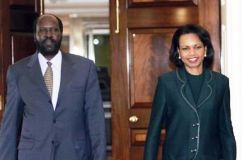US pushes Sudan’s vice president to do more in Darfur
Nov 1, 2005 (WASHINGTON) — The United States urged Sudan’s new unity government on Tuesday to do more to implement a peace deal and to stop violence in Darfur as U.S. lawmakers cut back funding for African peacekeepers struggling in Sudan.
 In meetings with top U.S. officials on Tuesday, Salva Kiir, Sudan’s first vice president and president of southern Sudan, was told his government needed to do more to stop violence, particularly if it wanted U.S. sanctions lifted any time soon.
In meetings with top U.S. officials on Tuesday, Salva Kiir, Sudan’s first vice president and president of southern Sudan, was told his government needed to do more to stop violence, particularly if it wanted U.S. sanctions lifted any time soon.
U.S. Deputy Secretary of State Robert Zoellick, who announced a visit to Sudan next week, told reporters the United States would like to see progress in a range of areas before it could consider lifting trade, economic and financial sanctions imposed in 1997.
“There are a number of items that we want to see progress on and that is one reason why I am going to Sudan to make sure that the policies under the comprehensive peace accord are on track,” said Zoellick at a joint news conference with Kiir.
Zoellick said he gave the same message via telephone to Sudan’s second vice president, Ali Osman Mohamed Taha.
Kiir declined comment on sanctions. “We will talk about them next time,” he told reporters.
Kiir took the place of former Sudanese rebel leader John Garang, who died in a helicopter crash last July, three weeks after taking office following a January peace deal aimed at ending a long civil war.
The deal included an agreement on the distribution of Sudan’s wealth, plans for a democratic transition and a referendum on secession for the south within six years of the peace deal.
It did not cover a separate rebellion in Darfur that has killed tens of thousands and prompted U.S. accusations leveled at Khartoum of genocide.
FUNDS CHOPPED
As Kiir was meeting in Washington with Zoellick, U.S. Secretary of State Condoleezza Rice and Vice President Dick Cheney, U.S. lawmakers stripped out $50 million in funding for African Union troops struggling to keep the peace in Darfur.
The money was taken out of a foreign funding appropriations bill and four senators immediately wrote to U.S. President George W. Bush urging him to find funds elsewhere.
“Darfur, as you recently reconfirmed, is the scene of ongoing genocide. The African Union is the primary line of defense against this continuing violence, disruption, and terror,” said the letter.
State Department spokesman Sean McCormack said earlier the United States had been at the forefront of providing humanitarian aid to Sudan and had already given $160 million toward the AU peacekeeping mission.
Aid groups said they were deeply concerned money was being cut for African peacekeepers who have struggled from the start due to a lack of funding.
“The administration has repeatedly called for African solutions to African problems and has clearly stated its policy of supporting the AU mission in Sudan. It must now put its money where its mouth is and deliver the funding,” said Sarah Margon, a policy adviser for Oxfam America.
Christian evangelical groups also condemned the move and said Republican congressional leaders had failed to live up to their promises in Darfur.
“This is simply unacceptable and is a tragedy for the people of Darfur,” said Rev. Richard Cizik, vice president of the National Association of Evangelicals.
(Reuters)
